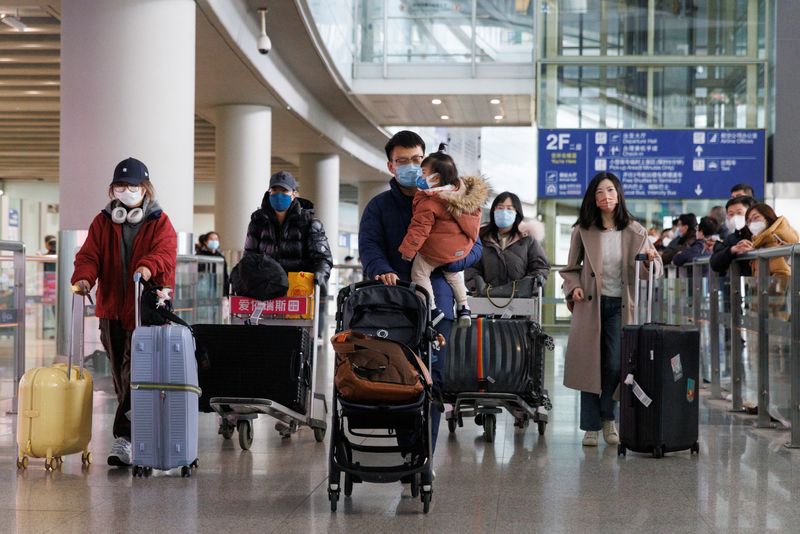China introduces visa restrictions due to COVID
2023.01.10 02:26

China introduces visa restrictions due to COVID
By Ray Johnson
Budrigannews.com – The first retaliatory action against countries imposing COVID-19 restrictions on travelers from China, where the virus is spreading unchecked, was announced on Tuesday by the Chinese embassy in Seoul that it would no longer issue short-term visas to visitors from South Korea.
After three years of isolation, China reopened its borders on Sunday, lifting the last significant restriction of a “zero-COVID” regime that it abruptly began removing at the beginning of December following historic protests against the restrictions.
The world’s second-largest economy has experienced one of its slowest growth rates in nearly 50 years as a result of the numerous lockdowns, testing, and other movement restrictions that have been in place since the beginning of 2020. This has caused widespread distress.
China has stopped publishing daily infection counts since the virus spread. Since the policy change, it has reported fewer than five deaths per day, which the World Health Organization disputes and is inconsistent with funeral homes’ claims of increased demand for their services.
In response to the COVID outbreak in China, testing requirements were implemented by the United States, South Korea, France, and others.
As international experts anticipate at least 1 million deaths in China this year, some governments have expressed concerns regarding Beijing’s transparency regarding the outbreak’s scale and impact. Washington has also expressed concern regarding potential virus mutations in the future.
Officials last week threatened retaliation against countries that require tests for people coming from China, despite the fact that Beijing also requires negative COVID test results from anyone landing in China.
China’s embassy in South Korea has for the first time suspended short-term visas for visitors from the country.
According to the statement made on its official WeChat account, the embassy will modify the policy pending the removal of South Korea’s “discriminatory entry restrictions” against China.
The announcement comes a day after Foreign Minister Qin Gang and his South Korean counterpart Park Jin discussed the restrictions during a phone call.
China claims that any future mutations are likely to be more infectious but less harmful, and that criticism of its data is politically motivated attempts to discredit its “success” in managing the pandemic.
On Tuesday, state media continued to downplay the outbreak’s severity.
According to a report published in Health Times, a publication that is managed by People’s Daily, the official newspaper of the Communist Party, a number of officials stated that the number of infections has been decreasing in the Chinese capital of Beijing as well as several provinces.
According to Kan Quan, director of the Office of the Henan Provincial Epidemic Prevention and Control, as of January 6, the infection rate among 100 million people in the central province was nearly 90 percent.
The acting mayor of Beijing, Yin Yong, stated that the capital had also reached its limit. According to Li Pan, deputy director of the Municipal Health Commission in Chongqing, the peak occurred on December 20.
The peak occurred on December 22 in the province of Jiangsu, and officials stated that “the first wave of infections has passed smoothly” in the province of Zheijiang. Before the end of the year, two cities in the southern province of Guangdong, China’s manufacturing capital, reached their peak.
The yuan reached a nearly five-month high on Tuesday as financial markets viewed the most recent border restrictions as merely an inconvenience.
Businesses across Asia, including South Korean and Japanese shop owners, Thai tour bus operators, and K-pop groups, are salivating at the prospect of more Chinese tourists, even though daily flights into and out of China are still a tenth of what they were before COVID.
Before COVID, Chinese consumers spent $250 billion annually abroad.
China was not only experiencing COVID conflict when it launched its retaliation against South Korea.
Pfizer Inc. (NYSE:) has also come under fire from the state media. over the cost of Paxlovid, its COVID treatment.
In an editorial, the nationalist tabloid Global Times stated, “It is not a secret that U.S. capital forces have already accumulated quite a fortune from the world via the sale of vaccines and drugs, and the U.S. government has been coordinating all along.”
Albert Bourla, CEO of Pfizer, stated on Monday that the company was in talks with Chinese authorities regarding Paxlovid’s price, but not about licensing a generic version in China.
China’s health system is ill-prepared as a result of the abrupt shift in COVID policy. Many hospitals are ill-equipped to handle patients in critical conditions, and smaller cities are scrambling to acquire basic anti-fever medication supplies.
According to Reuters, Youcare Pharmaceutical Group chairman Yu Weishi stated that his company increased daily production of its anti-fever medications by fivefold to one million boxes.
More Protests in Peru claimed lives of 17 people
Another pharmaceutical company’s general manager, Wang Lili, told Reuters that intravenous drips were their most popular product.
Since January 5, the company has eliminated weekends to meet demand.








